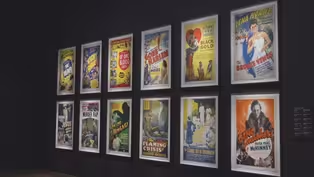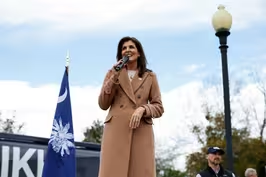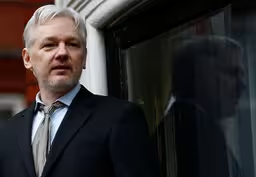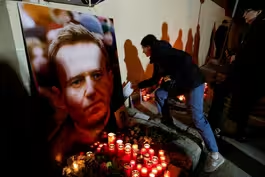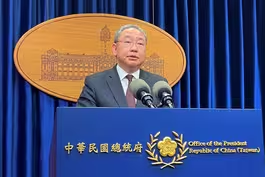
A Minnesota shooting and the U.S. domestic violence problem
Clip: 2/20/2024 | 6m 25sVideo has Closed Captions
Deadly Minnesota shooting sheds light on nation's growing domestic violence problem
A shooting outside of Minneapolis over the weekend is putting the spotlight once again on domestic violence. Two police officers and a paramedic responding to a domestic-abuse call were killed. Rachel Louise Snyder, who covers domestic violence and is author of the memoir, “Women We Buried, Women We Burned,” joins William Brangham to discuss how the incident fits into a broader national picture.
Problems playing video? | Closed Captioning Feedback
Problems playing video? | Closed Captioning Feedback
Major corporate funding for the PBS News Hour is provided by BDO, BNSF, Consumer Cellular, American Cruise Lines, and Raymond James. Funding for the PBS NewsHour Weekend is provided by...

A Minnesota shooting and the U.S. domestic violence problem
Clip: 2/20/2024 | 6m 25sVideo has Closed Captions
A shooting outside of Minneapolis over the weekend is putting the spotlight once again on domestic violence. Two police officers and a paramedic responding to a domestic-abuse call were killed. Rachel Louise Snyder, who covers domestic violence and is author of the memoir, “Women We Buried, Women We Burned,” joins William Brangham to discuss how the incident fits into a broader national picture.
Problems playing video? | Closed Captioning Feedback
How to Watch PBS News Hour
PBS News Hour is available to stream on pbs.org and the free PBS App, available on iPhone, Apple TV, Android TV, Android smartphones, Amazon Fire TV, Amazon Fire Tablet, Roku, Samsung Smart TV, and Vizio.
Providing Support for PBS.org
Learn Moreabout PBS online sponsorshipWILLIAM BRANGHAM: A shooting outside of Minneapolis over the weekend is putting the spotlight once again on domestic violence.
Police responded to a domestic abuse call and discovered a man armed with multiple guns who barricaded himself, seven children and other family members inside his home.
He killed two police officers and a paramedic, before turning a gun on himself.
The gunman was not legally allowed to own guns because of a previous assault conviction, and he had reportedly been accused of domestic abuse.
To better understand how what happened fits into a broader national picture, we're joined by Rachel Louise Snyder.
She's been covering domestic violence for 15 years and is the author of the memoir "Women We Buried, Women We Burned."
Rachel Louise Snyder, so good to have you on the program.
I want to just run through some pretty jarring statistics we just recently pulled from the CDC.
This says that over half of the women murdered in the U.S. are murdered by a male intimate partner.
Overall, a third of women in America and a quarter of men report suffering severe violence from intimate partners.
I also understand that these numbers have been rising in recent years.
Do we know why that is?
RACHEL LOUISE SNYDER, Author, "Women We Buried, Women We Burned": I think there's macro levels and micro levels.
I mean, on the macro level, they're -- women are not staying in bad marriages anymore, and we are better at gathering statistics, right?
That's a very simplistic view.
But, also, guns are far more prevalent, and they're used obviously for homicide, but they're used as threats.
They're used as coercion.
And I think that men also probably feel like they're losing ground.
I think, also, there's a way to read those statistics as positive, in that we have more resources now to help more people.
So there's a sense in which, the better the resources are, the more people are going to be able to come forward.
And so that in itself is a good thing.
But it's baffling, because you think, the more we know, the more we should be able to prevent it, and it doesn't seem to be the case.
WILLIAM BRANGHAM: Do we know how much the pandemic exacerbated domestic violence in America?
RACHEL LOUISE SNYDER: That's an interesting question, because, in the very beginning of the pandemic, rates of calls to hot lines went way, way down.
And that was a really disturbing sign.
And it sort of gets at what my previous answer was.
That was a really disturbing sign, because what it meant is that victims were unable to access resources and unable to make those calls.
Once things loosened up a little bit after the first couple of months, rates of calls to hot lines shot up in record numbers really all across the world.
And I think, coming out of the pandemic, there's a lot of exacerbating causes that are not in and of themselves enough to make somebody violent, but could trigger an already tense situation.
And those are things like economic factors, addiction.
And all that, all those kind of social ills have risen, I think, parallel to domestic violence.
WILLIAM BRANGHAM: If this nexus, as you are describing it, between domestic violence and guns is so clear -- and, again, with regards to the Minnesota case, we should say that case is still being investigated.
We don't really know the details of it.
But if that nexus is so clear, and it is illegal to possess a gun if you have a restraining order against you, why is this so hard to enforce?
Why is that not protecting more women?
RACHEL LOUISE SNYDER: That's a question that I bang my head against the wall asking.
I mean, the simple answer is, you can have a law, but that doesn't mean it's going to be enforced.
And it has to be enforced.
And when you look at places -- I mean, I should say there's a Supreme Court case addressing this right now.
We're waiting the -- on the decision.
But, right now, as you say, there is a federal law banning domestic abusers or anybody charged with a violent criminal act from owning guns, but those guns have to be collected by police officers or whatever.
And then, in the case of Minnesota, that man had an arsenal.
And if you ask -- you go around and ask jurisdictions why they don't enforce that, you will get a huge array of reasons, everything from, well, that's that person's recreation.
So you take the guns away, you're taking away the recreation.
Obviously, the Second Amendment has a place there.
We have a right to arm ourselves to the teeth.
And I have even had police chiefs say to me like, hey, we would love to enforce that, but we don't have a place to hold all these arsenals, thousands and thousands of guns.
When you look at a state like California that has enforced that, you see those gun charges go way down, you see homicides go down.
I mean, it's just mind-boggling, because, statistically, almost any way you look at it, if you take the guns, the rates of homicide and suicide and all other gun crimes go down.
But we just simply don't enforce it.
WILLIAM BRANGHAM: You touched on this, the Supreme Court.
This is the Rahimi case, I believe it is called.
Can you remind us what's at stake in that case?
RACHEL LOUISE SNYDER: Yes, that's essentially whether or not, since it comes out of -- it comes out of Texas.
A not very good guy had access to guns and then had his guns taken away from him when he got charges.
And his attorneys have -- he's in prison now, but his attorneys have filed suit saying he has a right to the Second Amendment, regardless.
And so they're looking -- that's what they're essentially deciding.
Do -- does someone who has a criminal charge have a constitutional right to the Second Amendment?
And those of us who are really familiar with the stats just are living in a kind of terror that the Supreme Court is going to rule that they somehow maintain that constitutional right, even though they have proven themselves to be a danger to their community.
WILLIAM BRANGHAM: All right, Rachel Louise Snyder, thank you so much for being here.
Really appreciate your insights.
RACHEL LOUISE SNYDER: Thank you for having me.
Exhibit chronicles rich history of independent Black cinema
Video has Closed Captions
Clip: 2/20/2024 | 6m 43s | Exhibit chronicles rich history of independent Black cinema (6m 43s)
Haley vows to stay in 2024 race as Biden prepares for Trump
Video has Closed Captions
Clip: 2/20/2024 | 5m 35s | Haley vows to stay in 2024 presidential race as Biden prepares for Trump (5m 35s)
Julian Assange tries to avoid extradition to the U.S.
Video has Closed Captions
Clip: 2/20/2024 | 12m 28s | Wikileaks founder Julian Assange makes last-ditch attempt to avoid U.S. extradition (12m 28s)
Low demand for commercial office space fuels economic fears
Video has Closed Captions
Clip: 2/20/2024 | 8m 10s | Low demand for commercial office space fuels economic fears (8m 10s)
News Wrap: Biden to impose new sanctions after Navalny death
Video has Closed Captions
Clip: 2/20/2024 | 4m 59s | News Wrap: Biden to impose major sanctions on Russia in response to Navalny's death (4m 59s)
Taiwan's top diplomat in the U.S. on tensions with China
Video has Closed Captions
Clip: 2/20/2024 | 8m 19s | Taiwan’s top diplomat in Washington discusses U.S. relations and tensions with China (8m 19s)
Providing Support for PBS.org
Learn Moreabout PBS online sponsorship
- News and Public Affairs

FRONTLINE is investigative journalism that questions, explains and changes our world.

- News and Public Affairs

Amanpour and Company features conversations with leaders and decision makers.












Support for PBS provided by:
Major corporate funding for the PBS News Hour is provided by BDO, BNSF, Consumer Cellular, American Cruise Lines, and Raymond James. Funding for the PBS NewsHour Weekend is provided by...
